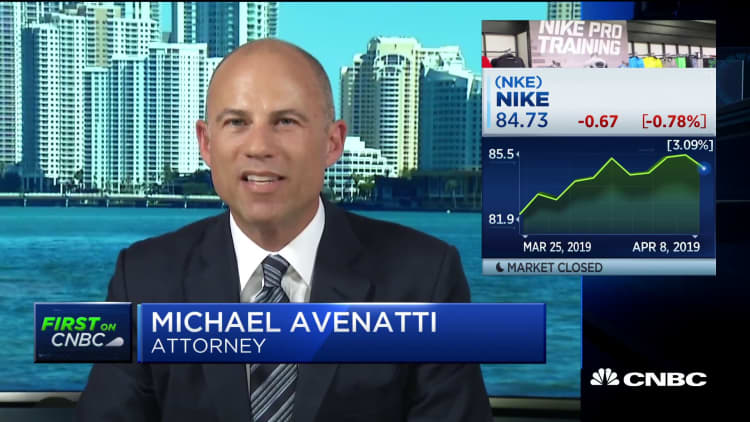Nike might not have that much to worry about as celebrity attorney Michael Avenatti hurls accusations its way.
The athletic apparel retailer has been thrust into the spotlight, for better or for worse, after it called on the Federal Bureau of Investigation to arrest Avenatti for extortion, ahead of him taking accusations about Nike public. He claimed at the time his accusations could damage the company and wipe $10 billion off its nearly $133 billion in market cap.
Avenatti used Twitter to dump 41 pages of documents he claims show Nike illegally paid families of basketball recruits to attend "Nike" colleges, and he claims he has even more evidence than that.
In a nutshell, Avenatti is alleging more than $170,000 has been paid out by Nike to family members of basketball players, including the Phoenix Suns' Deandre Ayton, former University of Nevada Las Vegas player Brandon McCoy and Oregon Ducks' Bol Bol. Duke University's Zion Williamson, soon-to-be No. 1 pick in the NBA draft, and his mother, Sharonda Sampson, haven't been formally named in any documents but have also been called out by Avenatti on Twitter, to which Duke has said it's "looking into" the matter.
Nike has so far only said it "will not respond" to Avenatti's allegations and that it's continuing to cooperate with the government's investigation into "grassroots basketball." EYBL, Nike's grassroots league (a pre-college prep program), was reportedly subpoenaed in 2017 in the wake of the FBI's investigation into college basketball corruption.
Some legal analysts have said Nike could be doing more to respond to Avenatti's brash accusations, giving the public reason to believe the company could actually be in trouble here. But Nike could also be, strategically, saying just enough. Why feed Avenatti more if the company doesn't need to?
"Nike has to protect their image and also protect shareholders and stakeholders from these allegations," said Ken Jewell, a managing partner at Jewell Law. "As long as Nike looks the victim of a shakedown, they have the upper hand. It is unclear if Avenatti is engaging in a war of attrition to wear the other side down. But if the documents do not exist, he risks all credibility."
Nike's stock on Tuesday midmorning was falling less than 1 percent, having rallied about 14 percent so far this year. Shares fell briefly on March 25, the day Avenatti first tweeted about his accusations, but ended up closing that Monday up less than 1 percent. Since March 25, Nike's stock has gained nearly 3 percent.
This case with Nike and Avenatti mimics a recent scandal involving Nike rival Adidas, in which three men were convicted of so-called pay-for-play schemes.
In that case, federal prosecutors said the defendants funneled money from Adidas to prospects who wound up playing basketball at Louisville, Kansas and North Carolina State, all Adidas-sponsored colleges. The schools were determined to be the "victims" here, prosecutors said, because they were unknowingly playing athletes who were ineligible per NCAA rules. Players are prohibited by NCAA rules from accepting payments beyond scholarships and other related costs.
Ultimately, the two former Adidas employees and an aspiring sports agent were convicted of fraud and sentenced to less than a year in prison. Adidas only came out to say it had "strengthened [its] internal processes and controls and remain committed to ethical and fair business practices."
One sports attorney said this set a "pretty strong precedent" for what's now happening to Nike.
"Nike has little or nothing to be concerned about," said sports attorney Darren Heitner, of Heitner Legal. "If there were illegal payments being made ... the individuals who were engaged in that activity have cause for that concern. There's nothing from a criminal standpoint that this corporate entity has to be worried about."
The victims of this type of scenario being laid out by Avenatti are the other universities, he explained, for not being given the opportunities to work with the same athletes as Duke, for instance, which is one of the colleges being targeted by Avenatti. "You are essentially locking up the players to perform and endorse your brand."
That said, Avenatti has taken to Twitter himself to claim what happened to Adidas is different from what's happening with Nike.
"Adidas execs faced criminal charges for much less," he wrote on Tuesday morning. "Nike execs and Nike as a company should all be indicted and held to account for their illegal conduct. Why should they get preferential treatment when their acts are far worse? The docs don't lie and [Zion Williamson] did not go to Duke for 0."
Still, this likely won't end up being a bigger issue for Nike unless it's uncovered that a top executive, such as CEO Mark Parker, knew what was going on under the table and failed to warn other employees and shareholders.
"I don't see a big issue here unless there is actual knowledge and conspiracy that runs all the way up the top of the company," Heitner said. "But if there are a few individuals acting in a rogue manner ... from a corporate standpoint, I think there is little to worry about."
What Nike stands to lose at this point is some consumers' trust, should people buying Nike sneakers or cheering for Nike basketball teams be upset with the situation. But the company has a pretty strong track record of not letting controversy — like when Williamson's Nike shoe blew out during a basketball game, giving him a knee injury — drag it down. Just this week, a new survey was released saying Nike is both the No. 1 apparel brand and athletic brand among teenagers, by wide margins.



